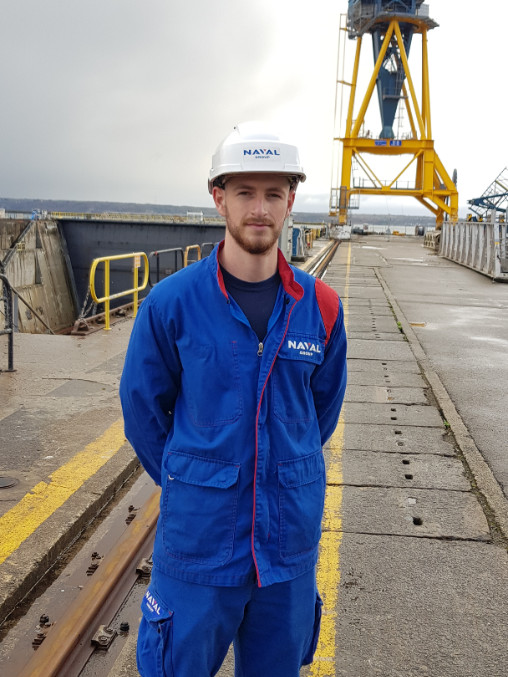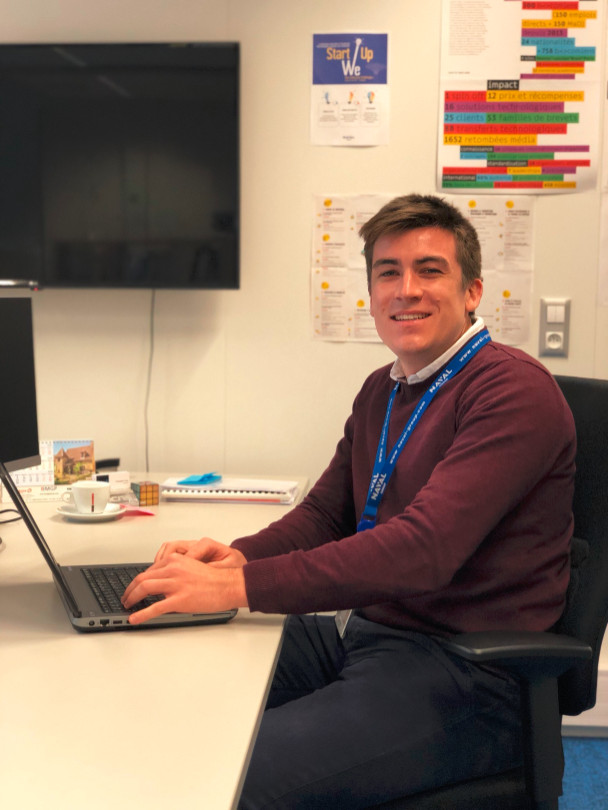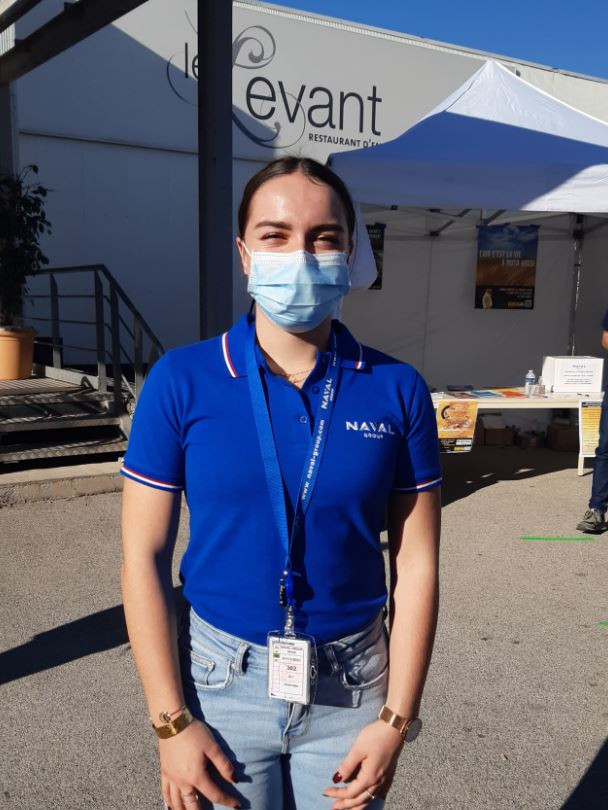Quick Bio
Mikaël Abiven, 25 years old, Shipwright apprentice in Brest, as part of an Industrial Metalworker Technician (TCI) vocational baccalaureate. Duration of work-study training: 1 year.
Charlotte Dodelin, 21 years old, Production-Integration Coordinator apprentice in Cherbourg, as part of a Mechanical engineering and production degree. Duration of work-study training: 3 years.
Rémi Scherfling, 22 years old, Business Developer for R&D projects apprentice at Technocampus Ocean in Nantes, as part of a second year master’s program in Strategic and operational marketing. Duration of the work-study training: 1 year.
Perrine Ohayon, 20 years old, Health and Safety at Work and Environment (H&SW/E) Prevention Advisor apprentice in Toulon, as part of a master's degree in Quality, Hygiene, Safety and Environment (QHSE), with a specialisation in management system and operational excellence. Duration of the work-study training: 2 years.
How is the transition between school and the company coming along?
Rémi: I currently spend three weeks in the company and one week at school. I find it easy to reconcile both, especially since I am always debriefed on the files as soon as I return to the company. There is a lot of information to process on the first day back, but it is always very clear. It allows me to quickly pick up the pace.
Mikaël: It is going well. I spend two weeks on site and two weeks at school. There is a noticeable difference between what I do at school and Naval Group. In class, we don't study the naval defence ecosystem; we focus on industrial metalwork. The techniques that I learn are quite different. However, it is a very enriching experience on both ends.
Charlotte: I am like Mikaël – two weeks at school and two weeks in the company. This rhythm is not always easy for my tutor, who cannot always assign me long-term missions. Despite that, my two-week missions are always very interesting and I always find my feet quickly.
Perrine: I spend one month at school, then one month in the company. This allows me to work on medium- and long-term projects. When I am at school, I am constantly in touch with my tutor because I need her for my case studies. I am not as lost when I return to the company. But the first day back is always quite intense and I spend the day rushing around.
Which projects have you worked on over these last months?
Rémi: I have been working on a project for the past two months, which consists in reporting on all the calls for projects – including the “France Relance” recovery plan – that are in the interest of Naval Group. I pass them on to the Technical Managers, who then assess the possibility of creating joint projects in line with their roadmap.
Mikaël: At the start of my work-study placement, I worked on the site of L’Ile Longue preparing the Full Cycle Docking (FCD) of the Terrible. Recently, I started working on the external part of the submarine and more specifically on the removal of its sonar dome (located on the fore end of the submarine) on the site of Brest, where the work is currently taking place.
Charlotte: I was in charge of coordinating the mechanical work with ship superintendents and team leaders. I monitored the technical issues that arose and coordinated their resolution while ensuring schedule compliance.
Perrine: I worked on fire-safety and fire-extinguisher training. I helped identify all trained and untrained employees on the site of Toulon in order to update our files. I was also in charge of drawing up an inventory of all the chemical products present in the workshops and on board the ships. These missions allowed me to meet the teams and familiarise myself with the naval base.
What do you feel you have brought to your team so far?
Rémi: My outside perspective and my ability to synthesize. We work on complex subjects alongside many contributors, and it is essential that they have the right information in order for us to move forward as a team.
Mikaël: My curiosity. My team is always happy to answer my questions, which, in turn, allows them to develop their teaching skills and pass on their knowledge.
Charlotte: My positive attitude, my energy and my interpersonal skills. When someone asks me to do something, I am very reactive and always try to answer in a positive manner.
Perrine: My academic knowledge, and my mastering of Microsoft Office! My colleagues provide field experience, and I provide the knowledge I acquire when I am at school.
On what aspects do you feel your skills have improved?
Rémi: My knowledge of the naval defence ecosystem, my understanding of the terminology. Project management and my ability to handle several files at once. Also, I received some help to improve my communication skills and I learned to adapt my language according to the person I am speaking to.
Mikaël: Everything involving technical vocabulary and the equipment used. Little by little, I am learning good practices. I can now find my way around the submarine by myself (refer to episode 1 “My first steps at Naval Group”).
Charlotte: My perseverance and my skilfulness. I am now more comfortable with digital tools, such as the ones we use for 3D modelling. My communication skills are also improving as my training progresses.
Perrine: All of them! Quality, Hygiene, Safety and Environment (QHSE) is an entirely new field for me. I am developing these new notions on a daily basis.
What challenges have you encountered and how have you overcome them?
Rémi: Understanding Naval Group’s ecosystem took me a little while. I was able to rely on the help of my team and on the available documents to understand the interactions between the company and its external partners.
Mikaël: Finding my way around the submarine and identifying the different locations. This was a big challenge when I first arrived. It is important to always ask your team lots of questions, and, above all, to always have a submarine pocket map with you!
Charlotte: Having to go back and forth between school and the company and to adapt back into company or school life is what I found a little bit difficult. I always keep in touch with my tutor, even when I am at school. He always gives me a rundown of what is going on while I am away.
Perrine: The hardest part was getting used to the work environment, which is quite particular (safety, confidentiality, the size of the teams and the areas). I managed to do so thanks to the incredible support provided by my tutor and the other people in my department, who showed me the inner workings of this rather unique world.

Mikaël Abiven, Naval Group

Charlotte Dodelin, Naval Group

Rémi Scherfling, Naval Group

Perrine Ohayon, Naval Group

